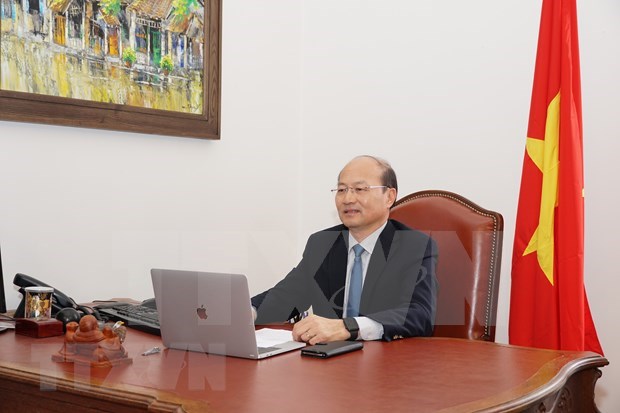
Ambassador Le Dung, Vietnam’s permanent representative to the International Atomic Energy Agency (IAEA) (Photo: VNA)
Addressing a teleconference of the IAEA Board of Governors from June 15 to 19, Dung welcomed the IAEA’s building of the Zoonotic Disease Integrated Action Project.
He expressed his belief that the project would help member nations develop nuclear technology so as to better manage pandemic threats such as COVID-19.
He told participants that Vietnam gained initial success in the fight against the COVID-19 pandemic, confirming 334 cases of infection by June 16 with zero fatalities.
The ambassador took the occasion to thank the IAEA for supporting Vietnam in applying RT-PCR, a nuclear-derived method, to detect the coronavirus SARS-CoV-2, as well as financial and technical contributions from such countries as the UK, the US, Japan, Canada, and Norway to help the agency provide its support.
During the teleconference, delegates discussed the main issues in the IAEA’s operations, such as its nuclear technical cooperation programs with members and the enforcement of the Treaty on the Non-Proliferation of Nuclear Weapons (NPT) Safeguards Agreements between the IAEA and Iran, Syria, and the Democratic People’s Republic of Korea (DPRK).
The Board of Governors is one of the two policy-making bodies of the IAEA, along with the annual General Conference of IAEA Member States.
The 35-strong board examines and makes recommendations to the General Conference on IAEA’s financial statements, programs, and budget. It considers applications for membership and approves safeguards agreements and the publication of the IAEA’s safety standards. It also appoints a Director-General of the IAEA, with the approval of the General Conference.
Vietnam has been elected to the IAEA Board of Governors many times and was Chair of the Board in 2013-2014./.
VNA
 Da Nang invests over 200 billion VND in semiconductor chip design, AI development
Da Nang invests over 200 billion VND in semiconductor chip design, AI development



